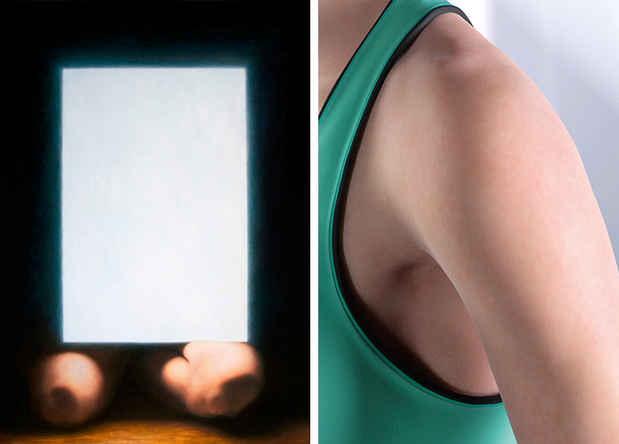Colleen Asper and Kate Cooper “Egress”
P!

This event has ended.
with Colleen Asper and Kate Cooper
organized by Sarah Hromack
“We talk of alienation. But the worst alienation is not being dispossessed by the other, but being dispossessed of the other: it is having to produce the other in the absence of the other, and so continually to be thrown back on oneself and one’s own image. If, today, we are condemned to our image (to cultivate our bodies, our ‘looks’, our identities, our desires), this is not because of alienation, but because of the end of alienation and the virtual disappearance of the other, which is a much worse fate. In fact, the definition of alienation is to take oneself as one’s focus, as one’s object of care, desire, suffering and communication. This definitive short-circuiting of the other ushers in the era of transparency. Plastic surgery becomes universal. And the surgery performed on the face and the body is merely the symptom of a more radical surgery: that performed on otherness and destiny. What is the solution? There is no solution to this erotic trend within an entire culture; to this fascination, this whirl of denial of otherness, of all that is alien and negative; to this foreclosing of evil and this reconciliation around the Same and its multiple figures: incest, autism, twinship, cloning. All we can do is remind ourselves that seduction lies in non-reconciliation with the other, in preserving the alien status of the Other. One must not be reconciled with oneself or with one’s body. One must not be reconciled with the other, one must not be reconciled with nature, one must not be reconciled with the feminine (that goes for women too). Therein lies the secret of a strange attraction.”
— Jean Baudrillard, “Otherness Surgery,” Screened Out, Verso, 2002
“Both the wearable and the weight scale offer the promise of agency through mediated self-knowledge, within rhetorics of normative control and becoming one’s best self. The idea of agency becomes deeply complicated in both technologies, mirroring the complex entanglements of information, consent and privacy. On the one hand, the act of purchasing and using a device reflects an intention and choice, and the ability to ‘know more through data’ can be experienced as pleasurable and powerful. When shared with others, such as in the QS community or wearable-centered fitness groups, it can also afford a sense of community. At the same time, there are complex questions of agency, privacy and consent. The body is tracked, documented and rendered meaningful through a device that records a wealth of data for the parent company, third parties and possibly insurers and employers, and only a small fraction of the potential and value of this data is returned to the user. Beyond the clear economic disparity, companies like Jawbone and Fitbit get to see aggregated data: the patterns of activity (and inactivity) across geography, class and gender among many other possible categories.”
— Kate Crawford, Jessa Lingel, and Taro Karppi, “Our metrics, ourselves: A hundred years of self tracking from the weight scale to the wrist wearable device.” European Journal of Cultural Studies, 2015, Vol. 18(4-5) 479–496
Colleen Asper is an artist whose work has been shown internationally and reviewed in publications such as Artforum, Art in America, The New York Times, and The New Yorker. Additionally, she has contributed writing to publications including Lacanian Ink, The Believer, and Paper Monument. She is currently an Open Sessions artist at The Drawing Center in New York, NY and has work on view there this July. Other upcoming exhibitions include a two-person show with Marika Kandelaki at Art in General in New York, NY and a solo show at The Suburban in Oak Park, IL.
Kate Cooper lives and works in London. She is the co-founder and director of the artist-led organisation Auto Italia, established in 2007. Past projects include Viewing Copy, CIC, Cairo, 2013; Immaterial Labour Isn’t Working, Auto Italia, London, 2013; Auto Italia LIVE, ICA, London, 2012; and It’s Like Staring Someone Out Who’s Not Even Looking At You, Tate Modern, London 2012. Exhibitions include Rigged, KW Institute for Contemporary Art, Berlin, 2014; Liebe Deine Maschine, Kunstverein Hildesheim, 2015; and Under The Clouds—From Paranoia to the Digital Sublime, Serralves Museum, Porto (upcoming). Cooper was shortlisted for the Film and Video Umbrella Prize: What Will They See Of Me?, Jerwood Space, London, and CCA, Glasgow, 2014.
Sarah Hromack writes about the intersections of art, technology, publications, and institutions; “What is Metahaven?”, her recent profile on the Dutch design firm, is featured in the summer 2015 issue of Frieze. She works as the Director of Digital Media at the Whitney Museum of American Art and teaches in the Department of Art and Art Professions at New York University’s Steinhardt School.
Media
Schedule
from July 13, 2015 to August 07, 2015
Summer Hours: Tue–Fri, 12–6pm.
Opening Reception on 2015-07-13 from 18:00 to 20:00